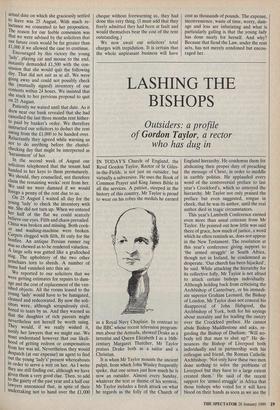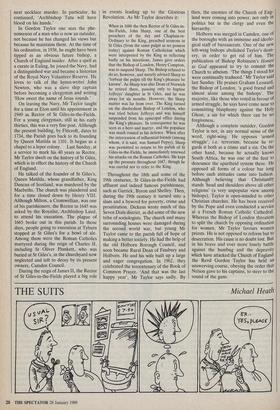LASHING THE BISHOPS
who has dug in
IN TODAY'S Church of England, the Revd Gordon Taylor, Rector of St Giles- in-the-Fields, is not just an outsider, but virtually a subversive. He uses the Book of Common Prayer and King James Bible in all the services. A patriot, steeped in the history of this country, Mr Taylor is proud to wear on his robes the medals he earned as a Royal Navy Chaplain. In contrast to the BBC whose recent television program- mes about the Armada, showed Drake as a terrorist and Queen Elizabeth I as a 16th- century Margaret Thatcher, Mr Taylor praises Drake both as a sailor and a Christian.
It is when Mr Taylor mounts the ancient pulpit, from which John Wesley frequently spoke, that one senses just how much he is now an outsider. Almost every Sunday, whatever the text or theme of his sermon, Mr Taylor includes a fresh attack on what he regards as the folly of the Church of England hierarchy. He condemns them for abdicating their proper duty of preaching the message of Christ, in order to meddle in earthly politics. He applauded every word of the controversial preface to last year's Crockford's, which so annoyed the hierarchy. Mr Taylor not only praised the preface but even suggested, tongue in cheek, that he was its author, until the real author died in tragic circumstances.
This year's Lambeth Conference earned even more than usual criticism from Mr Taylor. He pointed out how little was said there of grace, how much of justice, a word which he often reminds us, does not appear in the New Testament. The resolution at this year's conference giving support to `the armed struggle' in South Africa, though not in Ireland, he condemned as desperate. 'Our church has been hijacked', he said. While attacking the hierarchy for its collective folly, Mr Taylor is not afraid to attack certain bishops individually. Although holding back from criticising the Archbishop of Canterbury, or his immedi- ate superior Graham Leonard, the Bishop of London, Mr Taylor does not conceal his disapproval of John Habgood, the Archbishop of York, both for his sayings about morality and for leading the outcry over the Crockford preface. He cannot abide Bishop Muddlestone and asks, re- garding the Bishop of Durham: 'Will no- body tell that man to shut up?' He de- nounces the Bishop of Liverpool both individually and in partnership with his colleague and friend, the Roman Catholic Archbishop: 'Not only have these two men done nothing to solve the problems of Liverpool but they have to a large extent created them.' He said of the recent support for 'armed struggle' in Africa that those bishops who voted for it will have blood on their hands as soon as we see the next necklace murder. In particular, he continued, 'Archbishop Tutu will have blood on his hands.'
In Gordon Taylor one sees the phe- nomenon of a man who is now an outsider, not because he has changed his views but because he maintains them. At the time of his ordination, in 1938, he might have been tipped as an obvious future bishop, a Church of England insider. After a spell as a curate in Ealing, he joined the Navy, had a distinguished war and became a historian of the Royal Navy Volunteer Reserve. He loves to talk of the hymn-writer John Newton, who was a slave ship captain before becoming a clergyman and writing `How sweet the name of Jesus sounds.'
On leaving the Navy, Mr Taylor taught for a time at Eton until his appointment in 1949 as Rector of St Giles-in-the-Fields. For a young clergyman, still in his early thirties, this was a very fine post. Although the present building, by Flitcroft, dates to 1734, the Parish goes back to its founding by Queen Matilda in 1101. It began as a chapel to a leper colony. Last Sunday, at a service to mark his 40 years as Rector, Mr Taylor dwelt on the history of St Giles, which is in effect the history of the Church of England.
He talked of the founder of St Giles's, Queen Matilda, whose grandfather, King Duncan of Scotland, was murdered by the Macbeths. The church was plundered and for a time closed down by Henry VIII. Although Milton, a Cromwellian, was one of his parishioners, the Rector in 1645 was asked by the Royalist, Archbishop Laud, to attend his execution. The plague of 1665 broke out in this parish. In those days, people going to execution at Tyburn stopped at St Giles's for a bowl of ale. Among them were the Roman Catholics martyred during the reign of Charles II, including St Oliver Plunkett, who was buried at St Giles's, in the churchyard now neglected and left to decay by its present owners, Camden Council.
During the reign of James II, the Rector of St Giles-in-the-Fields played a big role in events leading up to the Glorious Revolution. As Mr Taylor describes it: When in 1686 the then Rector of St Giles-in- the-Fields, John Sharp, one of the best preachers of the day and Chaplain-in- Ordinary to the King, preached sermons in St Giles (from the same pulpit as we possess today) against Roman Catholicism which were interpreted by the King as reflecting badly on his intentions, James gave orders that the Bishop of London, Henry Compton, was to suspend Sharp. The Bishop refused to do so, however, and merely advised Sharp to `forbear the pulpit till the King's pleasure be known'. As Sharp was also Dean of Norwich he retired there, pausing only to baptise Jeffreys' daughter in St Giles, and he was away for six months. However, the Sharp matter was far from over. The King turned on the disobedient Bishop of London, who was tried before Jeffreys and was himself suspended from his episcopal office during the King's pleasure. In consequence he was seen as a hero and martyr, and the populace was much roused in his defence. When after the intercession of influential friends (among whom, it is said, was Samuel Pepys), Sharp was permitted to return to his parish of St Giles-in-the-Fields, he immediately renewed his attacks on the Roman Catholics. He kept up the pressure throughout 1687, though he was careful not to refer to the King.
Throughout the 18th and some of the 19th centuries, St Giles-in-the-Fields had affluent and indeed famous parishioners, such as Garrick, Byron and Shelley. Then, during the 19th century it turned into a slum and a byword for poverty, crime and prosititution. Dickens wrote much of this Seven Dials district, as did some of the new tribe of sociologists. The church and many surrounding houses were damaged during the second world war, but young Mr Taylor came to the parish full of hope of making a better society. He had the help of the old Holborn Borough Council, and soon became Rural Dean of Finsbury and Holborn. He and his wife built up a large and eager congregation. In 1962, they celebrated the tercentenary of the Book of Common Prayer. 'And that was the last happy year', Mr Taylor says sadly. By then, the enemies of the Church of Eng- land were coming into power, not only in politics but in the clergy and even the hierarchy. Holborn was merged in Camden, one of the boroughs with an immense and ideolo- gical staff of bureaucrats. One of the new left-wing bishops abolished Taylor's dean- ery, in order to get rid of him. The publication of Bishop Robinson's Honest to God appeared to try to commit the Church to atheism. 'The things I stood for were continually traduced.' Mr Taylor said last Sunday. He praises Graham Leonard, the Bishop of London, 'a good friend and almost alone among the bishops'. The majority, like those who voted in favour of armed struggle, he says have come near to committing blasphemy against the Holy Ghost, a sin for which there can be no forgiveness.
Although a complete outsider, Gordon Taylor is not, in any normal sense of the word, right-wing. He opposes 'armed struggle', i.e. terrorism, because he re- gards it both as a crime and a sin. On the other hand, because he actually knows South Africa, he was one of the first to denounce the apartheid system there. He opposed all forms of a colour bar long before such attitudes came into fashion. Although believing that Christianity stands 'head and shoulders above all other religions' (a very unpopular view among bishops), Taylor is open-minded to other Christian churches. He has been received by the Pope and even conducted a service at a French Roman Catholic Cathedral. Whereas the Bishop of London threatens to split the church by opposing ordination for women, Mr Taylor favours women priests. He is not opposed to reform but to desecration. His cause is no doubt lost. But in his brave and ever more lonely battle against the humbug and the depravity which have attacked the Church of England the Revd Gordon Taylor has held an unswerving course, obeying the order that Nelson gave to his captains, to steer to the sound of the guns.


















































 Previous page
Previous page